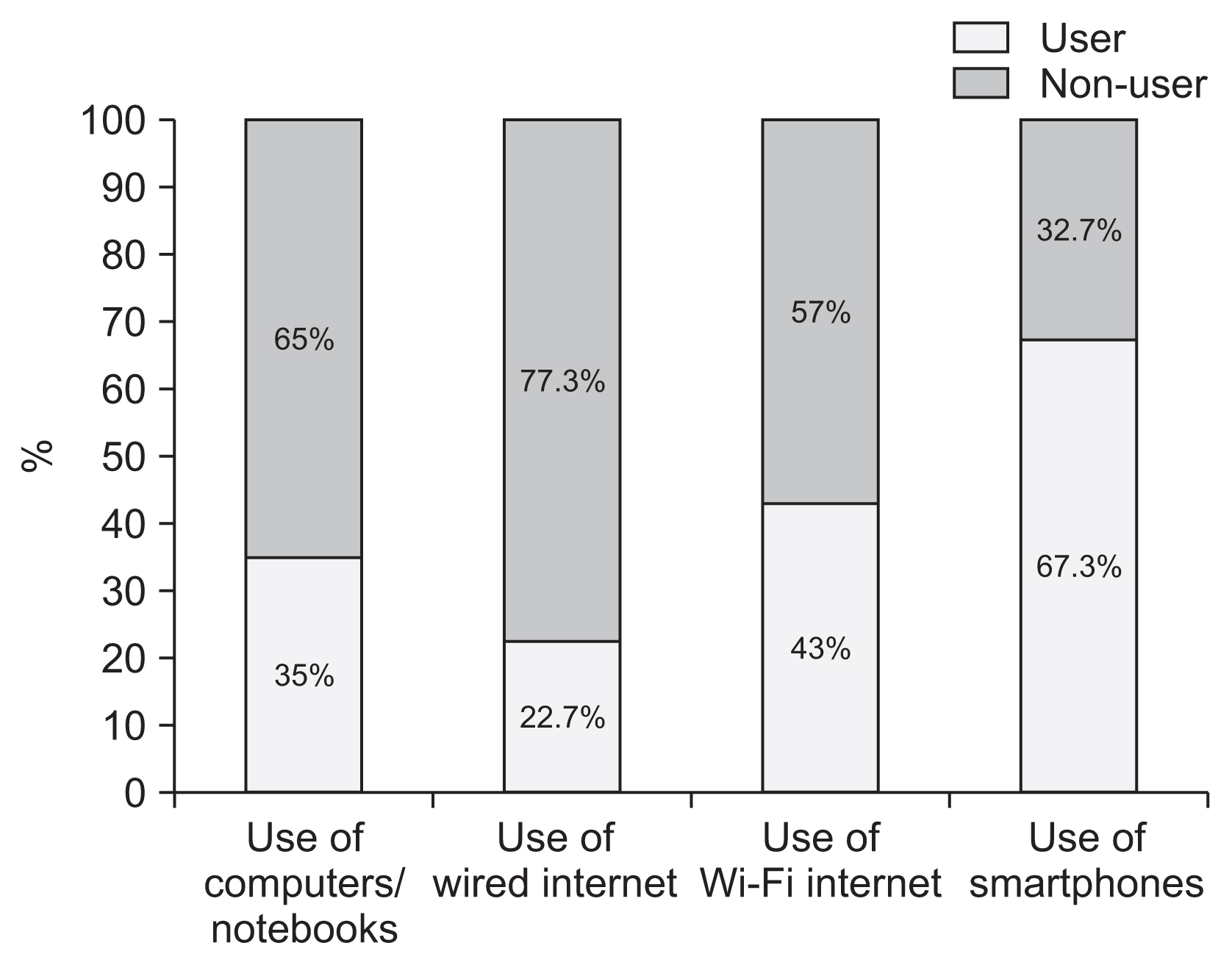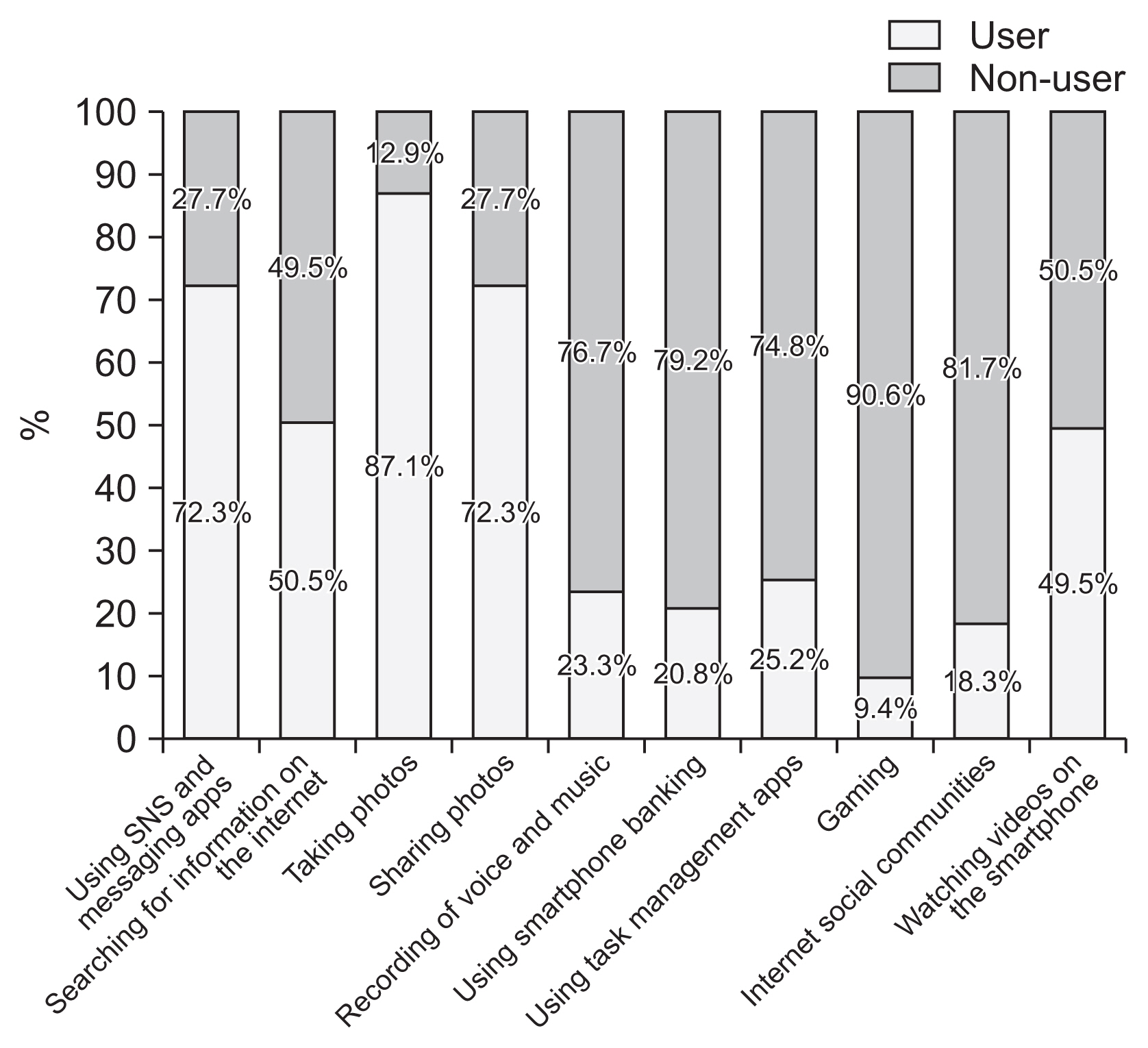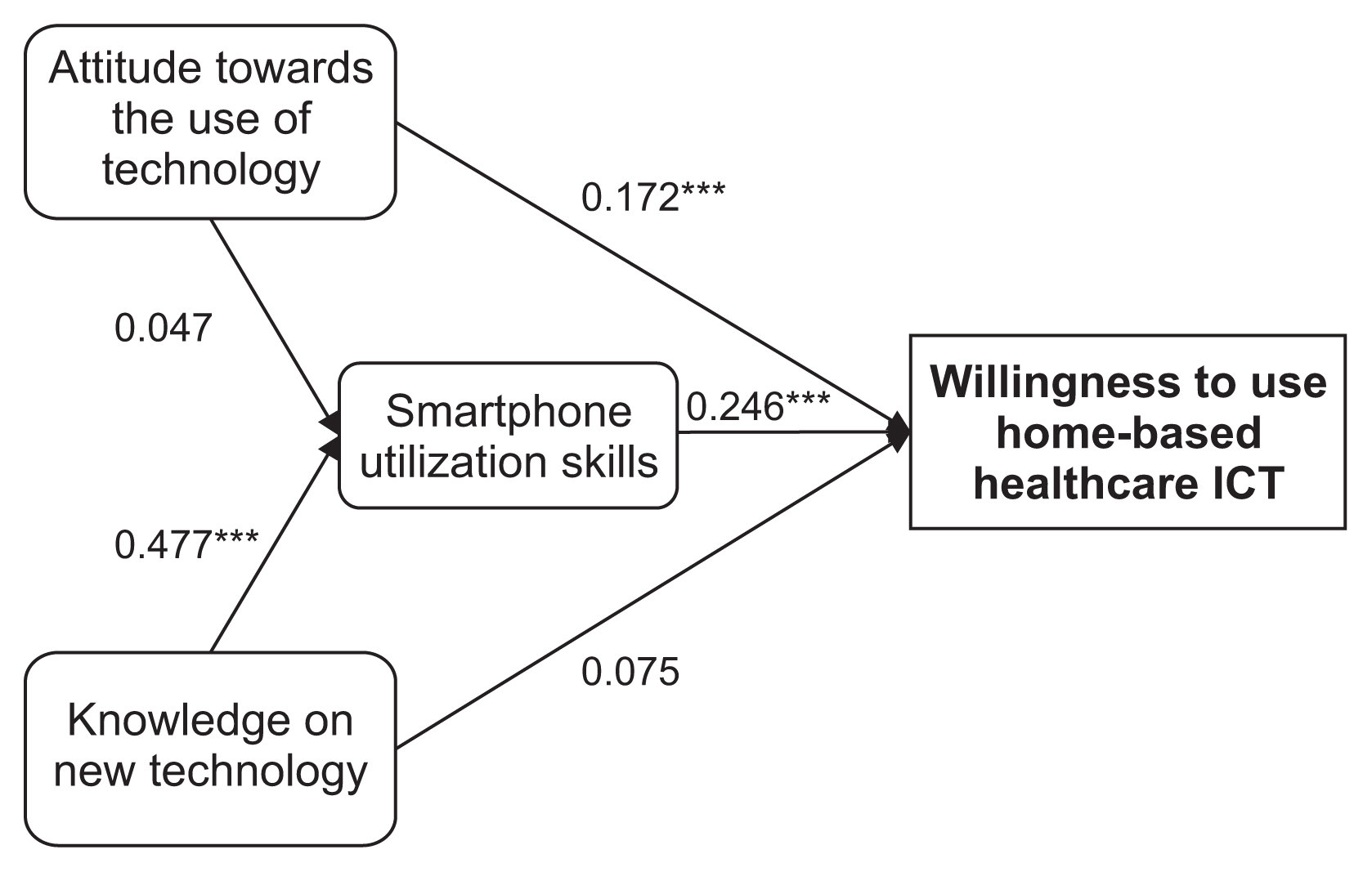Healthc Inform Res.
2021 Apr;27(2):137-145. 10.4258/hir.2021.27.2.137.
Mediating Effects of Smartphone Utilization between Attitude and Willingness to Use Home-Based Healthcare ICT among Older Adults
- Affiliations
-
- 1Department of Health Policy and Management, Kangwon National University School of Medicine, Chuncheon, Korea
- KMID: 2515916
- DOI: http://doi.org/10.4258/hir.2021.27.2.137
Abstract
Objectives
This study explored the direct and indirect effects of knowledge of new technology (e.g., artificial intelligence, the Internet of Things, and the Fourth Industrial Revolution), attitudes towards technology use, and smartphone utilization skills on older adults’ willingness to use home-based information and communication technology (ICT) for self-health management.
Methods
A phone survey was conducted among 300 older adults aged 65 or older in Gangwon Province, Republic of Korea. A path analysis was performed to identify the direct and indirect effects of knowledge of new technology, attitudes towards technology use, and smartphone utilization skills on willingness to use home-based healthcare ICT. Socioeconomic variables were used as control variables.
Results
Knowledge of new technology, but not attitudes towards technology use, had a direct impact on smartphone utilization skills. Attitude towards technology use and smartphone utilization skills showed significant effects on willingness to use home-based healthcare ICT. One standard unit change in attitudes towards technology use contributed to a 0.172 unit change in willingness (p = 0.001), and one standard unit change in smartphone utilization skills changed willingness by 0.246 units (p < 0.001). In addition, older adults with a higher education level and economic status, and lower self-related health status, were more willing to use home-based healthcare ICT.
Conclusions
These findings underscore the necessity of enhancing the smartphone utilization skills of older adults and attitudes towards technology use. Providing more user-friendly services and increasing smartphone utilization skills among older adults would contribute to willingness to use home-based ICT for healthcare management.
Keyword
Figure
Reference
-
References
1. Lim T. Population aging in Korea: macroeconomic impacts and financing national health insurance. Korean Econ Rev. 2016; 32(2):355–82.2. Abrashkin KA, Zhang J, Poku A. Acute, post-acute, and primary care utilization in a home-based primary care program during COVID-19. Gerontologist. 2021; 61(1):78–85.
Article3. World Health Organization. World report on ageing and health. Geneva, Switzerland: World Health Organization;2015.4. Cardozo L, Steinberg J. Telemedicine for recently discharged older patients. Telemed J E Health. 2010; 16(1):49–55.
Article5. Jasemian Y. Elderly comfort and compliance to modern telemedicine system at home. In : Proceedings of 2008, 2nd International Conference on Pervasive Computing Technologies for Healthcare; 2018 Jan 30–Feb 1; Tampere, Finland. p. 60–3.
Article6. Melkas H, Hennala L, Pekkarinen S, Kyrki V. Impacts of robot implementation on care personnel and clients in elderly-care institutions. Int J Med Inform. 2020; 134:104041.
Article7. Can WS, Seibt SD. Social robotics, elderly care, and human dignity: a recognition-theoretical approach. Seibt J, editor. What social robots can and should do. Amsterdam, The Netherlands: IOS Press;2016. p. 155–63.8. Mshali H, Lemlouma T, Moloney M, Magoni D. A survey on health monitoring systems for health smart homes. Int J Ind Ergon. 2018; 66:26–56.
Article9. Pal D, Triyason T, Funikul S. Smart homes and quality of life for the elderly: a systematic review. In : Proceedings of 2017 IEEE International Symposium on Multimedia (ISM); 2017 Dec 11–13; Taichung, Taiwan. p. 413–9.
Article10. Liu L, Stroulia E, Nikolaidis I, Miguel-Cruz A, Rincon AR. Smart homes and home health monitoring technologies for older adults: a systematic review. Int J Med Inform. 2016; 91:44–59.
Article11. Guner H, Acarturk C. The use and acceptance of ICT by senior citizens: a comparison of technology acceptance model (TAM) for elderly and young adults. Univers Access Inf Soc. 2020; 19(2):311–30.
Article12. Kapadia V, Ariani A, Li J, Ray PK. Emerging ICT implementation issues in aged care. Int J Med Inform. 2015; 84(11):892–900.
Article13. Schreurs K, Quan-Haase A, Martin K. Problematizing the digital literacy paradox in the context of older adults’ ICT use: aging, media discourse, and self-determination. Can J Commun. 2017; 42(2):359–377.
Article14. Agudo-Prado S, Pascual-Sevillana MA, Fombona-Cadavieco J. Uses of digital tools among the elderly. Revista Comunicar. 2012; 20(39):193–201.
Article15. Fisher JD, Fisher WA. The information-motivation-behavioral skills model. DiClemente RJ, Crosby RA, Kegler MC, editors. Emerging theories in health promotion practice and research: strategies for improving public health. San Francisco (CA): Jossey-Bass;2002. p. 40–70.16. Heerink M. Exploring the influence of age, gender, education and computer experience on robot acceptance by older adults. In : Proceedings of 2011, 6th ACM/IEEE International Conference on Human-Robot Interaction (HRI); 2011 Mar 8–11; Lausanne, Switzerland. p. 147–8.
Article17. Wolf EJ, Harrington KM, Clark SL, Miller MW. Sample size requirements for structural equation models: an evaluation of power, bias, and solution propriety. Educ Psychol Meas. 2013; 76(6):913–34.18. Rahimi B, Nadri H, Lotfnezhad Afshar H, Timpka T. A systematic review of the technology acceptance model in health informatics. Appl Clin Inform. 2018; 9(3):604–34.
Article19. Vassli LT, Farshchian BA. Acceptance of health-related ICT among elderly people living in the community: a systematic review of qualitative evidence. Int J Hum Comput Interact. 2018; 34(2):99–116.
Article20. Oh YS, Choi EY, Kim YS. Predictors of smartphone uses for health information seeking in the Korean elderly. Soc Work Public Health. 2018; 33(1):43–54.
Article21. Rasche P, Wille M, Brohl C, Theis S, Schafer K, Knobe M, et al. Prevalence of health app use among older adults in Germany: national survey. JMIR Mhealth Uhealth. 2018; 6(1):e26.
Article22. Pal D, Funilkul S, Charoenkitkarn N, Kanthamanon P. Internet-of-things and smart homes for elderly healthcare: an end user perspective. IEEE Access. 2018; 6:10483–96.
Article23. Mann JA, MacDonald BA, Kuo IH, Li X, Broadbent E. People respond better to robots than computer tablets delivering healthcare instructions. Comput Human Behav. 2015; 43:112–7.
Article24. Castilla D, Botella C, Miralles I, Breton-Lopez J, Dragomir-Davis AM, Zaragoza I, et al. Teaching digital literacy skills to the elderly using a social network with linear navigation: a case study in a rural area. Int J Hum Comput Stud. 2018; 118:24–37.
Article25. Xue L, Yen CC, Chang L, Chan HC, Tai BC, Tan SB, et al. An exploratory study of ageing women’s perception on access to health informatics via a mobile phone-based intervention. Int J Med Inform. 2012; 81(9):637–48.
Article26. Kim HS, Lee KH, Kim H, Kim JH. Using mobile phones in healthcare management for the elderly. Maturitas. 2014; 79(4):381–8.
Article27. Majumder S, Aghayi E, Noferesti M, Memarzadeh-Tehran H, Mondal T, Pang Z, et al. Smart homes for elderly healthcare-recent advances and research challenges. Sensors (Basel). 2017; 17(11):2496.
Article28. Zhao X, Wang L, Ge C, Zhen X, Chen Z, Wang J, et al. Smartphone application training program improves smartphone usage competency and quality of life among the elderly in an elder university in China: a randomized controlled trial. Int J Med Inform. 2020; 133:104010.
Article29. Xie B. Improving older adults’ e-health literacy through computer training using NIH online resources. Libr Inf Sci Res. 2012; 34(1):63–71.
Article30. Currie M, Philip LJ, Roberts A. Attitudes towards the use and acceptance of eHealth technologies: a case study of older adults living with chronic pain and implications for rural healthcare. BMC Health Serv Res. 2015; 15:162.
Article
- Full Text Links
- Actions
-
Cited
- CITED
-
- Close
- Share
- Similar articles
-
- The Effects of ICT Enhanced Home-visit Nursing in Long-Term Care Insurance on Health-related Quality of Life among Community-Dwelling Older Adults
- The Mediating Effects of Information and Communication Technology Use and Social Activity on the Relationship between Depression and Cognitive Function in Older Koreans
- Community-Based Home Healthcare Project for Korean Older Adults
- Effects of Information and Communication Technology Use on the Executive Function of Older Adults without Dementia: A Longitudinal Fixed-Effect Analysis
- Mediating Effect of Loneliness on Anxiety and Smartphone Overdependence among Korean Adolescents: Based on the 16th Korea Youth Risk Behavior Survey





